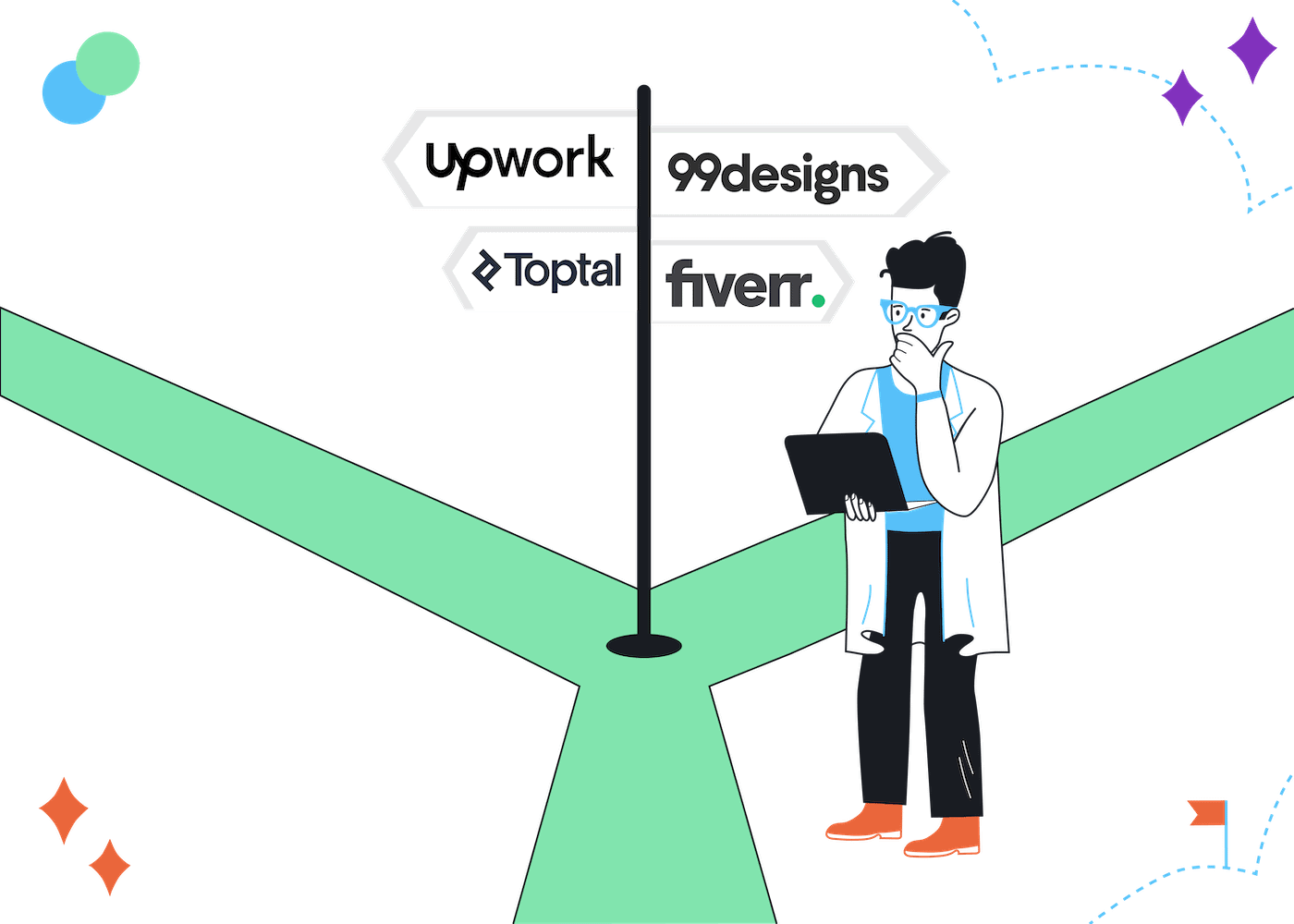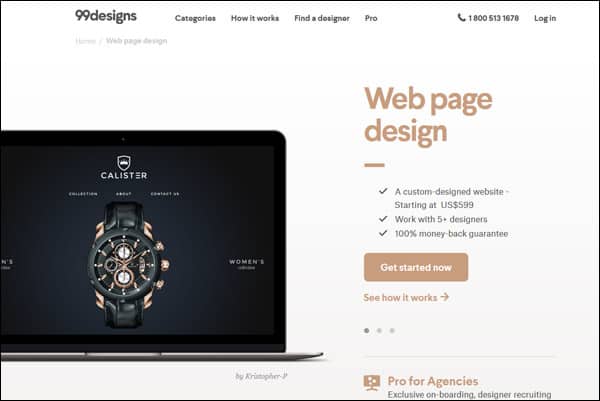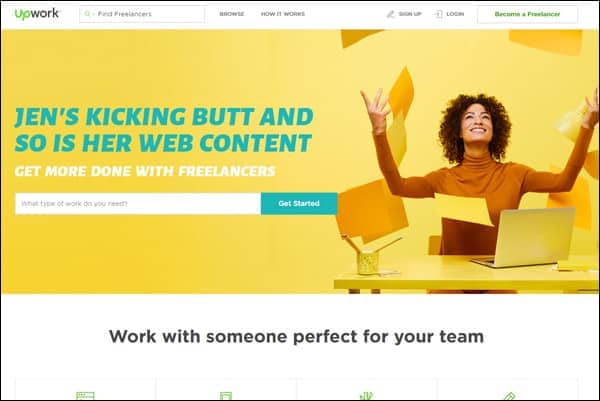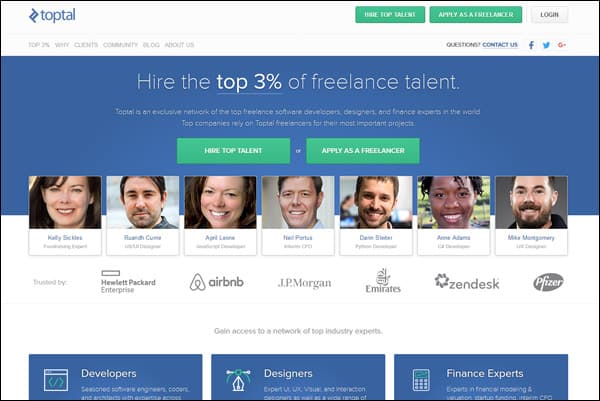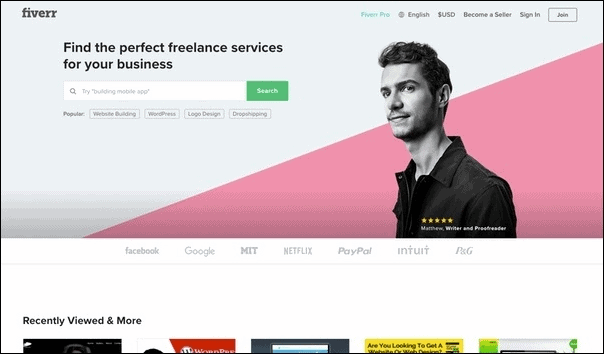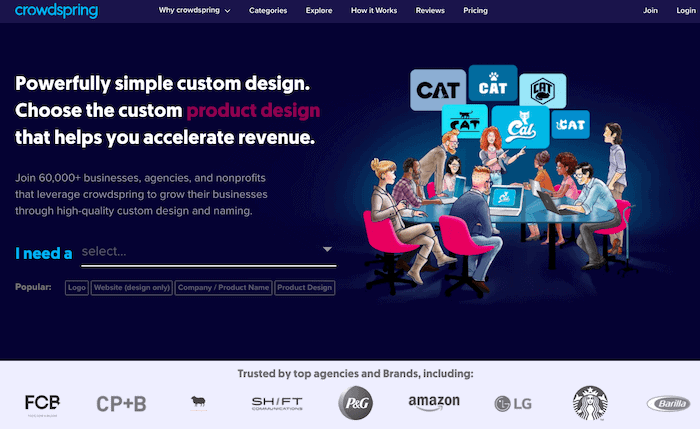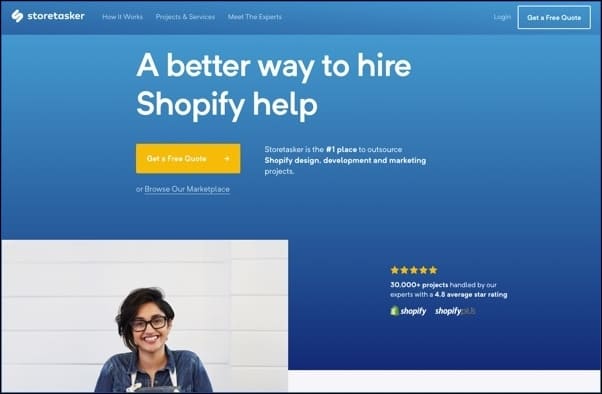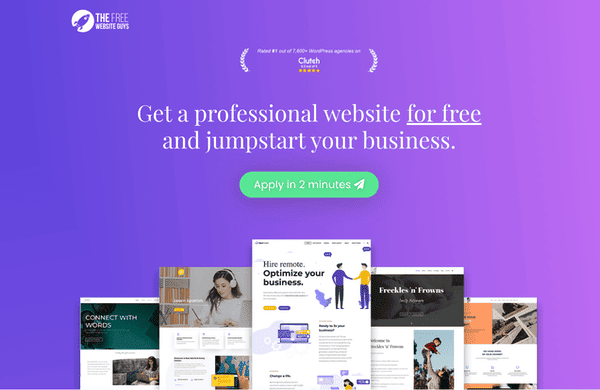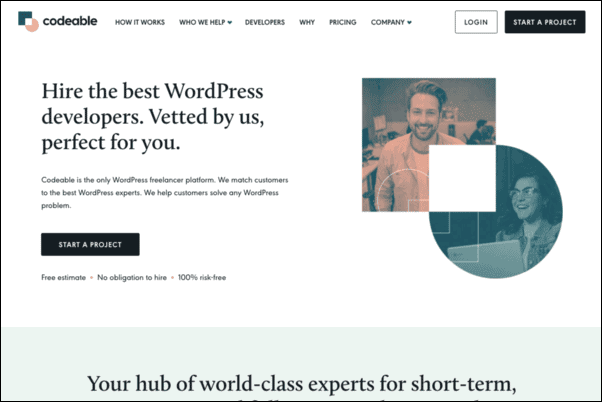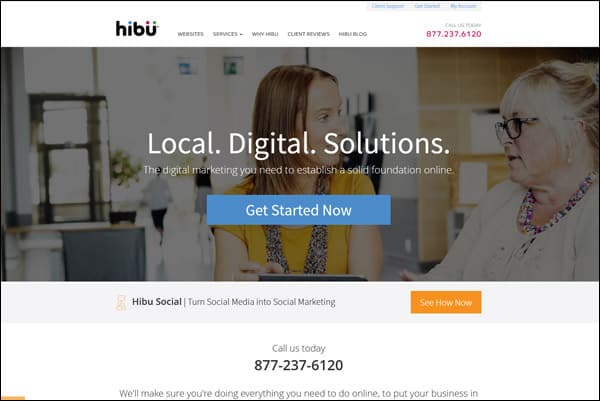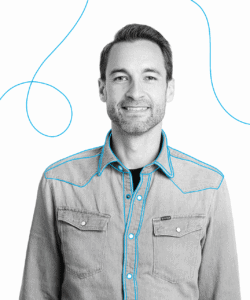Tooltester is supported by readers like yourself. We may earn an affiliate commission when you purchase through our links, which enables us to offer our research for free.
Let’s say you’ve decided that hiring a professional web designer is the best way to build and launch your website. At this point, your next challenge is to find the right designer or firm that’s a good match for your business and can deliver your site on spec, on time, and budget.
A quick search online will reveal millions of results for the term “web designer”. Freelancers and web agencies are all competing for your attention, eager to show you how great their work is and how experienced they are.
The truth is that the professional web design industry has experienced tremendous growth over the last decade, and the barriers to entry are still quite low. No qualifications are required to be a web designer and there’s no official group to assure you that the person you’ve entrusted with your website is good at their job.
As a result, finding a competent web designer has become more difficult, and finding the right fit requires investing a bit of your time. But here’s the good news – if you know WHERE to look, you’ve won half the battle.
Top Places to Find Freelance Web Designers
Listed below are some of the most popular places where you can find a freelance web designer to build your site:
| Place to go: | Pricing: | Recommended for: | Learn more |
|---|---|---|---|
| 99designs | Starts @ $599 | Find web designers by running a design contest | Visit site |
| Upwork | Avg of $15 to 75/hr | Find a freelance web designer/developer yourself | Visit site |
| Toptal | Avg of $75 to 90/hr | Work w/ a dedicated manager to find top-level designers & devs | Visit site |
| Fiverr | Avg of $150/page | Fixed-price website packages at very low prices | Visit site |
| crowdspring | Starts @ $899 | Web design and naming services via contests | Visit site |
| Storetasker | Avg of $700/project | A service specifically for Shopify ecommerce stores | Visit site |
| The Free Website Guys | Starts @ $0 | Who doesn’t like a free website – but where’s the catch? | Visit site |
| Codeable | Avg of $70 to 120/hr | Find a skilled & experienced WordPress developer | Visit site |
| Hibu | Custom quotes | Find an all-in-one website solution for local businesses | Visit site |
99designs
Great for finding web designers via a design contest.
www.99designs.com is one of our own favorite places for finding a web designer. They have a unique service that allows you to host a design contest where you can tell their web designers what you want and then the designers will compete amongst each other to submit the best design to you.
After all submissions have been submitted, you can choose the best design and work with that designer to further tweak or polish it. 99designs work off of a flat price, which is nice, and has several design packages to fit your budget.
However, do expect a bit of extra work going through rounds of feedback with different designers. Naturally, the lower-priced packages get you work with entry-level designers, whereas the higher priced ones get you work with top-level designers. All in all, 99designs is the place to really find that designer whose style you love as you will have a selection of designs to choose from.
Furthermore, you can get logos, business cards, and various other things besides your website designed for your business. Read our full review
Why 99designs?
- Large selection
- Host a design contest
- Pick your favorite design
- Affordable pricing
- Great 4 small businesses
- Receive various designs
- 100% satisfaction guarantee
- Various levels of talent
- Great 4 logos, cards, etc
Upwork
Great for hiring freelancers around the world for a variety of projects.
www.upwork.com is a popular website for freelance services that allows you to list the details of your project and review bids from different freelancers. Upwork is free to join, however, they do charge both clients and freelancers a low percentage fee based off the total price of the project, once a freelancer is hired. They do have access to an enormous pool of freelancers and remote teams on a global scale. It’s easy to hire on the platform:
Simply post a job outlining the scope of your project with your desired budget and then wait for freelancers to submit their bids for the work. Upwork offers proficiency tests to confirm freelancers’ competency with certain skills, lists previous clients’ feedback and ratings, and includes profiles which outline each freelancer’s portfolio, skills, rate and experience on the platform. However, not all freelancers take the proficiency tests and some may not have a lot of experience or feedback. It’s a great place to go, but you’ll still need to separate the wheat from the chaff to find the best web designer for your project.
Why Upwork?
- Free to join & post projects
- Small to large jobs
- Huge network of freelancers
- Wide variety of talent
- Hire globally or locally
- Escrow system in place
- Dispute resolution in place
- Feedback & rating system
- Fees based on total job $
Toptal
Great for complex websites requiring a team of professional designers & developers.
www.toptal.com is an excellent place for larger businesses and organizations to go and find the top designers and developers to work with. Toptal is meant for those with a serious development budget (typically $10k plus) and for those who do not want to take the risk of hiring wrong/cheap talent. Toptal gives you a dedicated manager who will assist you in finding the right talent for your needs.
All talent on the platform undergoes a strict screening process. Not only are their coding abilities scrutinized – but their communication skills, professionalism, and English proficiency are also thoroughly reviewed. In addition, Toptal offers a risk-free trial period for you to work with the talent to test out the waters. If you’re not happy, you can choose to work with another talent.
It’s perfect for those with complex projects requiring a team of knowledgeable web designers and developers. If you’re simply looking for some quick and affordable web design help, then Toptal won’t be the best fit. However, if your business or organization needs an experienced team for a long-term development project, then this platform is an attractive option.
Why Toptal?
- Large/complex projects
- Hire top talent
- Requires large budget
- No initial fee
- No bidding
- Pre-screened candidates
- High-quality work
- Low rate of project failure
- Dedicated manager
- Satisfaction guarantee
Fiverr
Website-packages at rock bottom prices.
www.fiverr.com is a growing platform for all kinds of services. As you can tell by its name, it targets users who would like to find a bargain. They have a large website development section for all kinds of website systems like WordPress and even website builders like Wix and Squarespace. Almost by default, you will be “geo-arbitraging” as most of the freelancers are from countries like Pakistan, Bangladesh, or India.
Because the cost of living is cheaper there, they are able to offer lower prices than your typical US-based web designer. Of course, that also means that communication can be a bit more challenging (different time zone and levels of English). Fiverr has a star rating system so you can check the satisfaction of previous buyers. It can be hit and miss but usually you won’t lose much money even if it doesn’t work out.
Why Fiverr?
- Very affordable
- Fixed-price projects
- Easy to purchase
- Large pool of freelancers
- Pay in all major currencies
- Available in 6 languages
- Usually fast turnaround times
- Star-rating system
crowdspring
For all your creative needs
Like 99designs, crowdspring is a platform where you can submit a project brief and crowdsource a designer. But it goes a step further: it also works with copywriters to provide naming services (e.g. company names, products, taglines). By covering the full scope of creative services, crowdspring is a convenient one-stop shop for anyone looking to launch a new brand or product.
Web design packages start at $899 for the Silver package, which includes around 25 submitted designs, and focus groups/polls to invite others to vote on designs. Upgrading to higher packages lets you limit the project to top-level designers only, and gives you priority customer support. If you’re pressed for time, you can even buy an add-on to reduce turnaround time to just 1 day.
We liked crowdspring’s easy briefing process, and the ability to choose from a list of different elements to include in the web page design (e.g. slideshow, search bar). We also appreciated its transparency around how much of the fee gets awarded to the winning designer.
Why crowdspring?
- Design and naming services
- Large pool of creatives
- Submit a project brief easily
- Receive multiple designs
- Affordable pricing
- Silver, Gold, Elite & Platinum packages
- 100% satisfaction guarantee
- Transparency
Storetasker
Ideal for ecommerce projects that run on Shopify.
www.storetasker.com is slightly different from the other services we mention here. It’s 100% focussed on Shopify. They have a network of vetted Shopify experts who must demonstrate a proven track record with the platform.
According to their website they have handled over 30.000 projects already. There are two distinct ways to get started: you either post a custom project and wait for the applications coming in, or you go to their marketplace and pick a predefined service (e.g. speed optimization or set up an email marketing provider).
To keep both the buyer and seller safe, they do Escrow payments and also offer a satisfaction guarantee.
Why Storetasker?
- Free to post projects
- Handpicked experts
- Marketplace with fixed price tasks
- Experienced with ecommerce
- 100% Shopify
- Escrow system in place
- Feedback & rating system
The Free Website Guys
Who doesn’t like a free website?
The Free Website Guys promise websites for zero, zip, zilch, nada. How is that even possible? Basically, what they do is create a WordPress site with a standard template. To be eligible for the offer, you have to apply. According to their website, they only accept about a third of all applications. So if you’re trying to create a personal blog for aunt Annie you probably won’t get accepted. Same goes if you’re trying to build the next Airbnb.
They are clearly focussed on small business websites, where they can ideally sell add-on services. Apparently, 18% of all their clients hire them for additional projects. Also, you will have to purchase hosting through them, which will award them a commission. They work with both Bluehost and Dreamhost.
Why The Free Website Guys?
- Get a free website
- Simple applications
- Geared towards small business
- Good ratings
- They use WordPress
Codeable
Great for WordPress and WooCommerce website projects.
www.codeable.io is an outstanding service for finding a quality WordPress developer. It’s great for any WordPress project, especially for eCommerce development with WooCommerce, the most popular shopping cart plugin for WordPress today. Unlike Upwork, Codeable developers don’t bid for jobs, which helps avoid the race to the bottom that you often see plaguing other freelancing platforms.
You’ll need to post a detailed description of your project, then freelancers apply and the price is calculated slightly higher than the average of their bids. Codeable adds a 17.5% fee to cover their 100% satisfaction guarantee, escrow service, and support.
Also, unlike Upwork, freelancers are interviewed and their work is thoroughly evaluated before they’re allowed to work on Codeable, which provides additional peace of mind that you’ll find a high-quality web designer for your project.
Why Codeable?
- #1 for WordPress
- #1 for WooCommerce
- Handpicked developers
- Escrow system in place
- Fair pricing estimates
- 100% satisfaction guarantee
- Skilled & experienced
- Great 4 theme & plugin dev
Hibu
All-in-one solution for local business websites
www.hibu.com is an all-in-one digital marketing solution for local businesses across the US. They build custom websites that look great, maximize visibility online, and engage visitors. More than just a professional web design agency, Hibu focuses on building and maintaining custom websites for small and mid-sized business owners while providing complete marketing solutions as well.
This includes growing and managing your business’s online reviews, social media marketing, search engine marketing, online advertisements, and directory listings. It really is an all-in-one solution to build, launch, and maintain your website. You also get 24/7 customer support to help you with any website or marketing questions you may have for your business. Hibu has built over 500,000 websites for businesses across the US within the last 10 years and is a desirable choice for those who want a worry-free alternative to a do-it-yourself website builder.
Why Hibu?
- All-in-one solution
- US-based local businesses
- Affordable custom websites
- Great 4 small businesses
- SEO, SEM, & marketing
- Dispute resolution in place
- No freelance talent
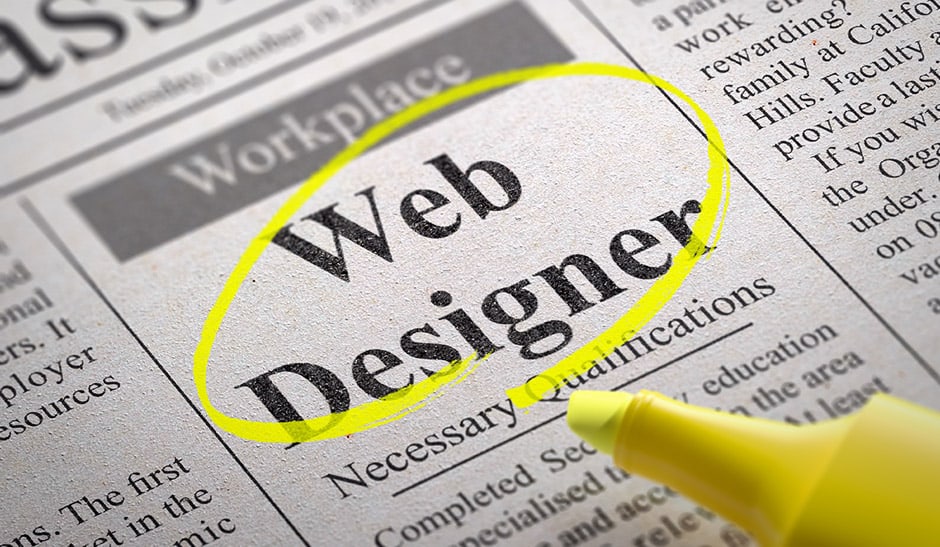
Go Local! How to Search for Local Web Designers and Firms in Your Area
Freelance websites are becoming more popular, however many business owners and entrepreneurs still prefer face-to-face meetings with the person or firm they’re hiring to build their website. If that’s the case for you, interviewing local firms first could be the way to go.
For community-driven businesses, hiring a local firm provides them with a new client, boosting the local economy, and helps you grow awareness for your business. Finding the right web designer or firm locally often starts with a recommendation from a trusted business associate. Here are a few tips on how to search for local web professionals in your area:
-
-
- Ask the people you do business with on a regular basis – it’s likely some of them have a web professional or a web agency that handles their website.
- Get the name of a reputable web professional or agency from your local Chamber of Commerce.
- Attend some Meetups in your area – look for a business owner or tech meetup – and ask for advice on finding the right person to build your website.
- You can still use online resources to find someone local. Do a Google search for local website designers or web agencies and browse their portfolio. Search for “your town name web designer” or “your town name web developer” to identify web professionals in your area. Visit the websites they’ve already built, and reach out to their clients to inquire about their experience with the designer or firm who built their website.
- If you’re a business that serves a specific niche – let’s say you practice law or run a restaurant – browse the websites of other lawyers or restaurants in your area to see which web designer or firm built their site. Some web professionals specialize in serving a particular business niche, which makes them especially helpful when it comes to building your site, and they’ll provide additional value by understanding your business needs and helping you achieve your goals.
- Look for a talented freelance designer through a specialized job board such as Krop, Authentic Jobs, Dribbble. Use the Location filter to browse just the professionals in your area.
-
Now that you know where to find web designers, I also want to equip you with the right questions for your new hire. This will ensure a smooth working relationship right from the get-go.
7 Questions to Ask YOURSELF Before Meeting with a Web Designer
Reaching out to a professional for web design work is a big step, and it’s important to have a clear understanding of your expectations and objectives to make sure your website is a success.
Take matters into your own hands by asking yourself the questions below. Answering these beforehand will also help you if you are publishing a project on a site like Toptal, Codeable, Upwork, or Storetasker.
Q1: What type of website am I building?
It’s a good idea to be as clear as possible with your vision for the website you want to build. Is it a “brochure site” that offers information about your existing brick-and-mortar business? Are you launching an eCommerce website that sells products or services? Are you developing a forum or social media site that targets a niche audience?
Knowing the type of site you want to build will help guide your choice of web designer. Some web designers specialize in eCommerce; others make fantastic sites for showing off your portfolio or highlighting the benefits of your consulting firm.
Keep in mind too that, if it’s a simple website, you might not even need a web designer. These days there are plenty of website builders like Wix, Squarespace, and Weebly that you’ll be able to use with basic computer skills.
Q2: Will I create and edit the content myself or have someone else do it?
If you have existing content from presentations, sales letters, or marketing materials, and you only need a web designer to “put it online”, then you can look for a candidate that’s a good match for creating a basic static site.
On the other hand, if you plan to have a blog or update the content on your website on a regular basis you’ll need a web designer who can help you set up a content management system (CMS) like WordPress, Joomla or even a website builder like Squarespace or Shopify.
Be sure to consider your time creating content. Some web designers will also provide content as part of their services. If you need content or graphics on a regular basis and you don’t have the time, it’s helpful to hire a web designer who can bring all those services to the table.
Usually, your web designer will outsource things like copywriting or graphic design, as it’s unlikely to find someone who is good at everything.
Q3: What are the goals of my website?
Websites are more than pretty pictures and fancy interactive effects, they’re powerful tools geared towards meeting business goals. You should ask yourself: How is my website going to accomplish my business goals?
Think about what you want people to do on your website. Is it subscribing to your email list? Or, is it getting people to contact you with queries about your services? Maybe you’re running an eCommerce site and you want people to buy your products?
By building your website with your goals in mind, you’ll be able to assess its success based on hard facts rather than vague notions, subjective aesthetic opinions, or the latest web design fad.
Q4: Who is my target audience, and how do they get to my website?
Before you hire a web designer, think carefully about your ideal client or customer. Your website’s main goal is to be a magnet for your target audience, and it should be designed to serve them when they land on your homepage.
To understand your target audience and how they get to your website, ask yourself these questions:
-
-
- What is my target audience looking for?
- What problems or needs am I addressing for them?
- How does my target audience search for solutions?
- What answers are they expecting to find to their problems?
-
It may be that you don’t know the answer to all these questions. After all, that’s why you’re hiring a web designer to help you get your business online. If that’s the case, be sure to check that potential candidates also offer help with marketing or can point you in the right direction to find answers.
Q5: How do I plan to drive traffic to my website?
Once you’ve identified your target audience, you’ll still need to get them to visit your site. The Internet is a noisy place, and you’ll need a strategy to cut through the noise and grab people’s attention. It’s not simply enough to “put your website online” and hope people will find it, you’ve got to drive traffic to your site on a consistent basis, be it via search engines like Google or social media sites like Facebook.
Here are some questions to help you guide your plan to drive traffic to your site:
-
-
- How will people learn about my website?
- What content will I offer to keep them engaged and keep them coming back?
- Can I do it myself or will I need help from a web professional to drive traffic?
-
Here again, you may not know how to drive traffic to your website. That’s OK too. It’s simply one more thing to keep in mind for your hiring process. Look for a web designer who can help you drive traffic to your site or consult to help you find the resources you need.
Q6: What’s my budget?
It’s likely that “What’s your budget?” is one of the first, if not the first, question web designers are going to ask when you first approach them. It’s better to ask yourself beforehand and be better prepared when you meet with a web designer about building your site.
Once you’ve decided on the goals for your website, you’ll need to set aside a budget. In other words, how much are you willing to invest to achieve those goals? Not only does this make good business sense, it also keeps you grounded when you discuss website features with a web designer. For instance, if you have a budget of less than $5,000, asking for a full-fledged online store, blog, and custom design, is probably asking too much.
Keeping realistic expectations about your budget will help make sure your first conversation with a web designer goes well.
Q7: Did I carefully review the information on the candidates’ websites?
Most web designers and web agencies put tons of information on their websites that can be invaluable to you. Here are a few things you can learn simply by browsing their sites:
-
-
- Services they offer
- Onboarding process for clients
- Project management process and tools
- Previous and current clients
- Portfolio of work
-
These were the questions you should ask yourself before hiring a web designer. Once you’ve found interesting candidates you can ask them to answer the following questions.
11 Questions to Ask the WEB DESIGNER During the Interview Process:
After reviewing the questions above to prepare yourself, the next step is to set up interviews with web designers. As a small business owner, you’re familiar with conducting interviews and meetings, both in-person and remotely. Having a list of well-thought-out questions is the key to a successful interview.
However, the technical and jargon-laden language on some specialized web design and development websites can make it challenging to create a list of good questions, even for someone who is familiar with conducting interviews.
To help make your hiring process more productive, we’ve gathered the most important questions to ask when interviewing web designers:
Q1: What services do you offer?
It’s good to know the full range of services a web designer offers before you hire them. Some web designers offer only website design and do not provide backend development or coding services (meaning that they can only do very simple static sites). Others may work more like an agency, offering additional services like search engine optimization (SEO), pay-per-click (PPC) marketing, email newsletters, and more.
While many web designers are capable of wearing a few different hats, being an expert across a wide range of fields is tough for any one person.
Q2: On a scale of 1 to 10, what’s your experience with my industry?
Some web designers or web agencies specialize in building websites for particular types of businesses, for example, salons, restaurants, attorneys, or automobile repair. Hiring a web professional who has experience working in your industry can add value to your project. They know the functionality your website needs and how to implement it, they know your target audience and what they’re looking for, and they know who your competitors are and can help you drive results.
One thing to be careful of here. When a website design firm specializes in a particular industry, make sure the designs aren’t too “cookie-cutter”, especially when you want to differentiate yourself from your competition.
Q3: Can you show me the latest website that’s relevant to my project? Can you walk me through the process you used to design the site?
Portfolios are helpful but can quickly become outdated as a designer completes projects. Ask to see recent work to get the best view of your potential web designer’s skills. Better still, ask to see the most recent website they’ve built that’s relevant to your project. Even when they haven’t worked with a business in your industry before, ask them to show you a recent example that’s a close match for your goals.
Beyond how “good” the examples look, ask some further questions to get a better understanding of each web designer’s approach to a project:
-
-
- What problems did you solve?
- Why did you choose solution X instead of solution Y?
- What process did you follow?
- What were the goals for the website (and did you meet them)?
- Can I contact your client for a reference?
-
Q4: Will you provide a detailed proposal and what will it cost?
A detailed proposal from your web designer can help you understand every service they offer and their associated fees. It’s a good sign when your potential web designer or web agency asks lots of questions about your business and your customers. Great proposals are based on a good grasp of your business needs and are geared towards providing solutions that meet those needs.
Pricing is based on many factors and each web development firm prices their services differently. Hourly, contract and fixed rates are all common. For you as a client it can be advantageous to work on a fixed price as you’ll have a very clear idea of what you are paying.
Q5: How long will it take to complete my website?
Any website proposal you receive should include an estimated time for completion. Keep in mind that good designers often have other clients. Web design timelines can change as requirements change, so your completion date could be pushed back from your original estimate.
Of course, you want to launch your site as soon as possible, but rushing the project won’t help. To ensure a successful outcome, it’s wise to get involved in the project as much as you feel comfortable, working together with your web designer: sharing your business expertise and knowledge of your customers, offering constructive feedback, and providing any graphics, images or content your web designer needs to move forward with the project. Any delay on your part providing this information will inevitably postpone the website launch date.
Q6: Which content management system do you use?
Most websites are built using a content management system (CMS) that separates the backend code from design and content. This should allow you to update the content on certain parts of your site, without requiring you to learn any complex web code.
However, not all CMS platforms are created equal. Ask to see a demo of the system your designer plans to use. If your web designer wants to use his own proprietary CMS, this could be a big red flag. Generally, it’s much better to build upon a CMS like WordPress that is widely used and where it’s easy to find a replacement developer should you part ways one day.
Q7: Will my team be able to access and edit the website once it’s published?
Related to the question regarding CMS, you’ll want to know whether you can make changes to your site. Relying on a designer to update content can cause delays when you need to change something quickly. Ask what you can edit once the website is published and make sure you know how much it costs if you need your web designer to make a change.
When you’re interviewing potential web designers you can also ask if they provide training for you to learn how to update your website yourself. Choosing a good CMS like the examples we provided will make it easier to learn how to update content yourself.
Q8: Do you offer ongoing maintenance once my site is published? What if something breaks? Do you offer any warranty?
Software is constantly being updated, and new changes to one type of code on your website can affect other code, requiring further changes to keep everything working together correctly.
It’s a smart move to ask what kind of maintenance is required for your website and what options your web designer provides. Some content management systems are integrated with a specialized hosting environment that helps minimize customer maintenance tasks by automatically updating your site (e.g. Managed WordPress Hosting).
However, you should be prepared in case something goes wrong, for instance: the code base has bugs or security holes that are only detected after launch, updates require further changes to the code, or the worst-case scenario, your website gets hacked.
Be clear about what you expect from your web designer in these circumstances, ask how much it will cost, and how long their support will be available.
Q9: Will I own my website, domain, assets?
Another concern for businesses is the copyright or legal ownership of the website and all its components. You’ll want to have a contract in place that clearly outlines the ownership of your website. This contract should allow you to take your website to another designer in the future, or add your own modifications to it, without incurring any additional charges or penalties.
If you are hiring through a platform like Toptal, 99designs, or Upwork, they usually take care of basic contractual issues like ownership and non-disclosure agreements (NDA). And, very importantly, you can leave a rating for your web designer, which can be important leverage in case they are not doing what you agreed upon.
Q10: What do I need to supply before work on the website begins?
Discussing what you need to bring to the table will help you avoid delays in the project schedule and misunderstandings with your web designer. It’s vital that you have an understanding of what content or assets you need to provide.
This may include:
-
-
- Copy
- Images
- Videos
- Logos
- Legal stuff, e.g., terms and conditions, privacy policy, etc.
- Credentials for login to your hosting accounting (if you’re dealing with the hosting company)
- Premium plugins and themes that you may need to purchase
-
Overall, the design of a website is a huge project that needs your input: be clear with your web designer on what your responsibilities are and do your best to fulfill your side of the bargain.
Q11: Will I be able to expand my website as my business grows?
If you plan to expand your website as your business grows, you should consider this now (e.g. adding further language versions, a blog, or an online store). A full redesign might be required to add new functionality if a website isn’t developed with the future in mind. Be sure you can add new features to your site as needed. One good example here is the WordPress platform, which can be easily extended by adding new plugins.
Last Words of Advice for Hiring a Web Designer
These questions will help you identify and hire the best web designer for your business. However, there’s always the human factor. Even though you’re putting in the effort to minimize the risk of choosing the wrong web designer, there’s no bulletproof way of knowing how you will work together.
Give your web professional a small trial project before committing yourself to a long-term website design and development project. It’s a smart move to make sure the relationship works for both parties.
Conclusion
Finding the right web designer will take some of your time, but you’ll be happy you didn’t rush this part of the process. Using our list of resources above, you can search an incredible pool of talent from all over the world.
Once you’ve found a good set of candidates, the next step is to schedule a meeting or interview and ask the right questions to make sure you’ve found the best web designer for your website and the needs of your business.
And if none of this feels right you can also give it a try yourself. There are plenty of easy to use website building tools that will only cost you a fraction of the price of a web designer. Of course, you’ll have to invest your own time but it can be a very rewarding experience to create your own website.
We keep our content up to date
20 Jan 2023 - Envato Studio closed down
03 Jan 2022 - Smaller updates and ranking changes
18 Nov 2021 - Free Website Guys added
17 May 2021 - Added crowdspring
5 Mar 2021 - Added full review of 99designs
22 Jul 2020 - Added Fiverr.com
02 Jun 2020 - Codeable fees and screenshot updated. Storetasker added.
THE BEHIND THE SCENES OF THIS BLOG
This article has been written and researched following a precise methodology.
Our methodology